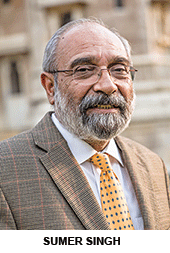 Special education for gifted children is an idea which is becoming increasingly popular worldwide. In our neighbourhood — Singapore, China, Korea and Thailand — dedicated schools for gifted children are mushrooming. Worried about well-trained youth from such special schools taking the best jobs from Americans, some states within the US have also legislated in favour of special education for gifted children. Even as egalitarian a country as Denmark has acknowledged the need to pamper gifted children.
Special education for gifted children is an idea which is becoming increasingly popular worldwide. In our neighbourhood — Singapore, China, Korea and Thailand — dedicated schools for gifted children are mushrooming. Worried about well-trained youth from such special schools taking the best jobs from Americans, some states within the US have also legislated in favour of special education for gifted children. Even as egalitarian a country as Denmark has acknowledged the need to pamper gifted children.
I have had personal experience of observing the functioning of a high-end school for gifted children. The school is excellent with facilities worthy of envy. The children however are another story — extremely hardworking with little time to be children. All high achievers, they are purpose-driven, serious and successful.
The gifted child has been defined as one who makes discoveries of her own and requires minimal structural support for learning. This child is said to be very different from the normative, hard working and well-schooled child. The former is advised ‘you are what you can do’ and the latter as ‘you are what you score’. These definitions are somewhat confusing because they seem to imply that the gifted child cannot be a high scorer in examinations.
Yet from the wider perspective of what’s good for society, the idea of special schools with special resources for gifted children is disturbing. Students given to believe they are superior and deserving of more than their fair share of society’s resources, are likely to believe they are entitled to great responsibility and the attendant benefits of power and wealth. Even at the once idealistic Harvard University, more students than ever are expressing the opinion that acquiring wealth is more important than adhering to moral and ethical norms — reminiscent of the college student who prays “Lord make me chaste but not right now”.
Whether Batman or the Joker is more academically gifted can be debated. But for society to educate for brilliance without a balancing dose of morality and ethics could mean we end up a society dominated by Jokers. It’s also relevant to question whether it is correct and morally justified to allocate disproportionate resources for the education of gifted children. On the contrary, it is eminently arguable that ‘ungifted’ children are more deserving of additional care and resource allocations. Therefore against this backdrop of moral and ethical dilemmas arising out of promoting special schools for gifted children, it makes much better sense to pay attention to developing gifted teachers.
Applying the well-known 20:80 theory — which posits that 20 percent of any community, company, society or institution is responsible for 80 percent of its success — my plea for consideration by educationists, principals and the educators’ community is that instead of giving up on 80 percent of our children, let us concentrate on transforming 20 percent of the nation’s teachers into gifted teachers!
There’s no shortage of research studies which confirm that students who hate maths, science and history etc were victims of bad teachers in their formative and impressionable years. Nonetheless some teachers will argue that in the same class other students excelled in these very subjects. For countering this argument, I am indebted to Dr. Howard Gardner who provided the insight that children learn differently utilising varied intelligences at a given time. This is where the gifted teacher plays a crucial role. She creates an environment in which children learn in their own way, utilising their most developed intelligences. The gifted teacher is able to create an environment where learning becomes enjoyable for all, where the learning process is collaborative rather than competitive, and in which there are options on how to learn.
The typical traits of a gifted teacher are that she will generate excitement about learning through stories and anecdotes drawn from her own life, and connect learning with non-academic activities beyond the classroom. She feels for her students, gets to know them individually and offers sympathy and encouragement. She makes students responsible for their own actions, and engages positively with them to teach them how to learn.
The gifted teacher offers choices and alternate solutions. Choices lead to interest, which in turn leads to enjoyment of and engagement with the learning process. Choices also lead to opportunities which in turn lead to experiences. And in the final analysis, education is an accumulation of documented experiences.
Finally, the gifted teacher is aware she doesn’t have to compete with Google as the repository of all knowledge. She has the wisdom to answer a conundrum by unabashedly stating: “I don’t know. Let’s find out together.” Therefore rather than building special schools for gifted children who grow up with a sense of entitlement and egos to match, and who because of hubris may step off straight and narrow paths, it makes much better sense to establish high quality — even special schools — to develop gifted teachers.
This is the blindspot of India’s politicians and education establishment.
(Sumer Singh is principal of The Daly College, Indore)
Also Read:Two days of hope and inspiration


























